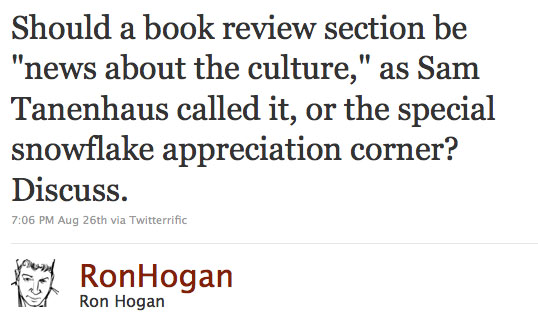Franzenfreude Is Only the Tip of the Iceberg

Jonathan Franzen’s new novel, Freedom, isn’t even out yet, and already it’s become one of the most talked-about novels of the year—although, if truth be told, for the last week people have actually been talking more about how much people have been talking about Freedom than they’ve been talking about the novel itself. Let me explain: Jennifer Weiner, who also has a new novel out this summer (Fly Away Home), pointed out that the folks who run the book coverage at The New York Times sure do love them some Franzen, based on the number of articles they’ve written about him and his book, and she noted that this attention (which she called “Franzenfreude”) is just the latest manifestation of the Times tendency to dwell obsessively on Great White Male Novelists—I can’t recall offhand if she used specific examples, but she could certainly have cited the ways in which, after the publication of I Am Charlotte Simmons, the Times became, as I put it, “the newspaper that cried Wolfe,” or their fixation on John Updike after the publication of Terrorist, as examples. Soon after Weiner’s remarks, Jodi Picoult reinforced the message with a tweet that said, in part: “Would love to see the NYT rave about authors who aren’t white male literary darlings.”
It’s not surprising that much of the media coverage has tried to frame the resulting argument as “women who write bestselling commercial fiction take out their resentment over a lack of critical respectability on a literary man,” but there’s a lot more to this situation than mere personality conflict. Weiner and Picoult, among others, are giving us a valuable critique of a serious problem with the way the Times—and, frankly, most of the so-called literary establishment—treats contemporary fiction. Which is to say: They ignore most of it, and when it comes to the narrow bandwidth of literature they do cover, their performance is underwhelming, “not only meager but shockingly mediocre,” as former LA Times Book Review director Steve Wasserman said three years ago. And it hasn’t gotten any better since then, leaving us with what Jennifer Weiner describes as “a disease that’s rotting the relationship between readers and reviewers.”
30 August 2010 | theory |
The Brief Return of the Maslin Watch
From yesterday’s review of the new Anne Rice:
Christ the Lord shares predilections with her other books. Even in biblical times and in the Holy Land, Ms. Rice retains her obsessions with ritual and purification…”
Because, God knows, an obsession with ritual and purification stands out as unusual in the Holy Land of biblical times.
4 November 2005 | theory |

 Our Endless and Proper Work is my new book with Belt Publishing about starting (and sticking to) a productive writing practice.
Our Endless and Proper Work is my new book with Belt Publishing about starting (and sticking to) a productive writing practice. 
